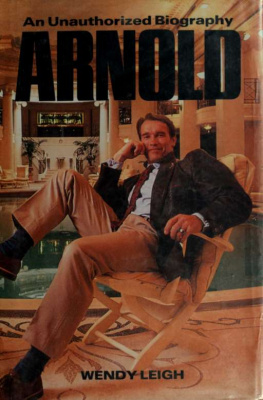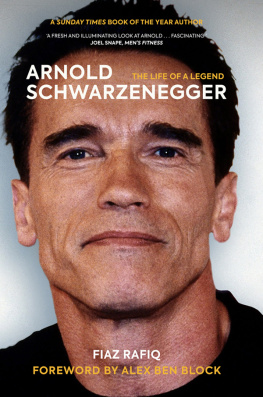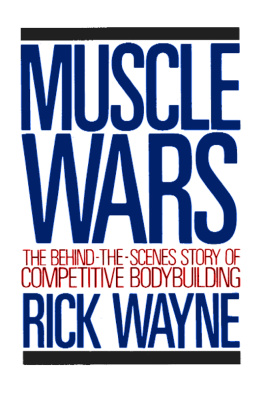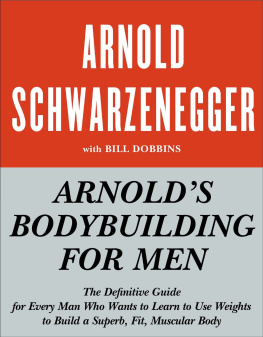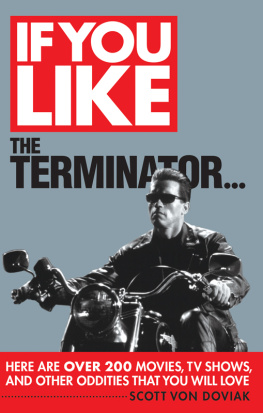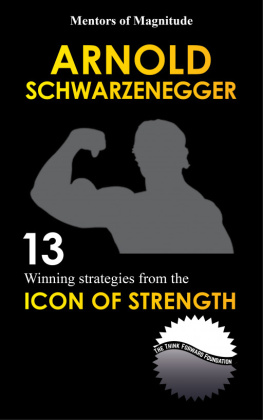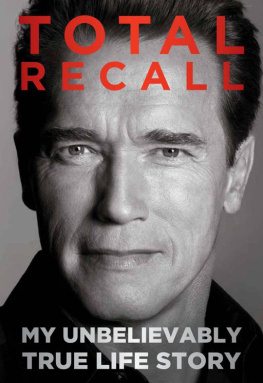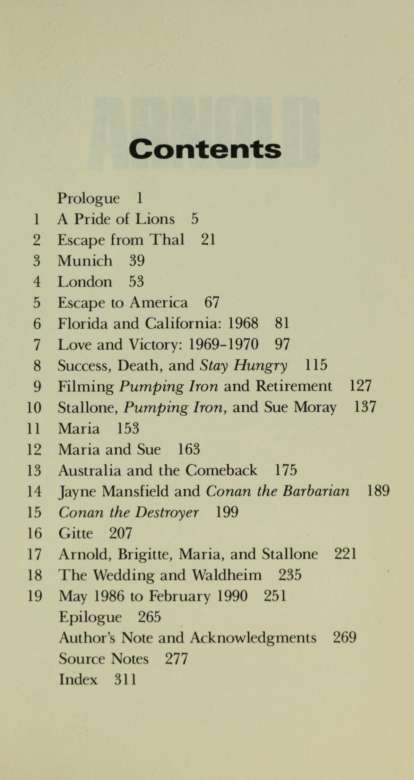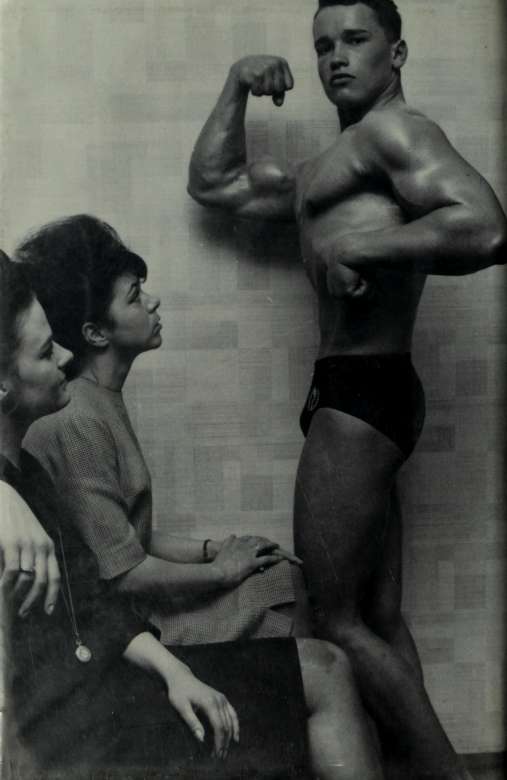This book made available by the Internet Archive.
ACKNOWLEDGMENTS OF PERMISSIONS
Grateful acknowledgment is made for permission to use material from the following:
Bad News at Black Rock: The Sell-Out of CBS News by Peter McCabe. 1987 by Peter McCabe. Reprinted by permission of William Morrow & Co.
"Bodybuilding; State of the Art. 1975" by Jim Stingley, 1975 by the Los Angeles Times, November 16, 1975. Reprinted by permission.
Conan by Robert E. Howard. Reprinted by permission of Conan Properties, Inc.
"The High Price of Sudden Fame" by Jeanne Wolf, Cosmopolitan, November 1988.
"How Much Bigger Can Arnold Schwarzenegger Get?" by Lynn Darling, Esquire, March 1985.
"It's Not Easy, Being Arnold Schwarzenegger" by Christopher Ward, London Daily Mirror, March 8, 1968.
"The Money in Muscle" by Gene Stone, California Business, October 1988.
"Muscle Madness: The Incredible Boom in Male Body-Building" 1977 by Leonard Todd, Cosmopolitan, August 1977.
f^uscle Wars by Rick Wayne, 1985 by Rick Wayne. Reprinted by permission of St. Martin's Press, Inc.
"Playboy Interview: Arnold Schwarzenegger," Playboy, January 1988; 1987 by Playboy. Reprinted by permission. All rights reserved. Interview conducted by Joan Goodman.
"Pumping Arnold" by Nancy Collins, Rolling Stone, January 17, 1985; 1985 by Straight Arrow Publishers, Inc. All rights reserved. Reprinted by permission.
"Penttiouse Interview: Arnold Schwarzenegger" by James Delson, 1981 by Penthouse: and "Schwarzenegger's Kurt Replies" by Sharon Churcher, 1989 by Penthouse. Reprinted by permission of Penthouse Publications International, Ltd.
"The Self-Made Man" by Theresa Carpenter, Premiere, January 1989.
"Winning According to Schwarzenegger" by Marian Christy. Boston Globe, May 9, 1982. Reprinted courtesy of the Boston Globe.
Arnold isn't my book alone. It evolved thanks to the research, administrative skills, and interviewing talent of Stephen Karten, my husband. This is dedicated to Steve with my love and gratitude for making it our book.

Prologue
On APRIL 26, 1986, ARNOLD SCHWARZENEO
ger married Maria Shrivcr at the Roman Catholic Church of St. Francis Xavier, Hyannis. The international press who had flocked to Massachusetts to cover the wedding were convinced that they knew every single detail of the groom's story: at twenty-one he had arrived in America a penniless bodybuilder, born in an obscure Austrian village, armed only with the immigrant's time-honored weapons of hope, ambition, and an almost supernatural belief in the great American dream.
Now, through the traditional virtues of hard work, talent, charm, intelligence, positive mental attitude, and persistence, Arnold Schwarzenegger had become a household name, a legendary hero whose life story thrilled millions of fans throughout the world. Seven times Mr. Olym-pia, he was the first athlete ever to make the transition from sports figure to major box office draw. As Johnny Weis-muller, Reg Park, Steve Reeves, Jim Brown, Fred Williamson, O. J. Simpson, and Merlin Olsen all fell by the cinematic wayside, only Arnold had successfully stormed the silver screen, currently commanding a stupendous $10 million per film.
Arnold Schwarzenegger epitomized the classic rags-lo-riches heroa Horatio Alger figure who had conquered America and made it his oyster. And today, eighteen years after he had first set foot on American soil, he was about to capture the richest pearl of all: marriage to one of America's great romantic prizes, John F. Kennedy's niece, Maria
Shriver. In the media's view Arnold Schwarzenegger's story was a great American saga of survival, triumph, and success, an inspiring tale of an immigrant who beat the odds. But that was only part of the truth.
Inside the church while the wedding guests waited with bated breath for the bride to appear, a canny observer could have divided them into groups. And within the fragments of each group each member represented a splinter of Arnold's past and held one of the many keys to its truth.
These groups were not only a testament to one of Arnold Schwarzenegger's most admirable qualities loyaltybut also a demonstration of his continuing attachment to those who helped him attain his stupendous success. There was the German and Austrian faction, men well versed in the struggles of his early years, represented by Albert Busek, who was privy to intimate stories of his reckless Munich years. There was the British bodybuilding group, led by Wag Bennett, who guarded the truth about Arnold's youthful indiscretions with a fervent dedication. Then there were the American bodybuilders, the ones who knew him when he first came to the States and was defeated, the ones he then conquered and made his own. There were the celebrities, now his peers, like Andy Warhol and Grace Jones, who knew only Arnold the movie star. And there were the businessmen, like Jim Lorimer, men who had helped Arnold make millions through real estate and bodybuilding contests and who praised him for his financial acumen.
Finally, of course, there were the Kennedys and the Shrivers. Jacqueline Kennedy Onassis was there; so were Caroline, John Jr., Teddy, Joan, and Ethel, as well as Maria's father, Sargent Shriver, who gave the bride away, and her mother, Eunice, who used to be JFK's favorite sister. The Kennedys and the Shrivers, as the canny observer might have commented, appeared on the surface to be the most important group at the Schwarzenegger/ Shriver nuptials. But at the same time not only they, but
also the bride herself, probably knew less about the groom than any other group present.
Only two wedding guests probably came close to knowing the entire truth about Arnold: best man Franco Colimibu, his "blood brother," whose bodybuilding career mirrored his own, and his mother, Aurelia, resplendent in a violet dress, protected from the unseasonably cold New England weather by a full-length mink, most likely a gift from her son. As Aurelia watched Arnold and Maria walk down the aisle of the church where once both Bobby and Jack Kennedy had been altar boys, she must have marveled at how far destiny had brought her, had brought Arnold. Teddy Kennedy was her escort for the occasion, Gustav, her husband and Arnold's father, having died fourteen years before. But perhaps his spirit was watching. And perhaps only Gustav would have understood and appreciated the truth, applauding the incredible odyssey that had transported his son from a tiny Austrian village to America as Arnold embraced not only the radiance and the promise but also the ruthlessness and the dark side of the American dreama dream that had finally swept him into the very heart of one of the most powerful families in America. Only Gustav would have truly appreciated the dazzling triumph of the will that is Arnold Schwarzenegger.
Next page
